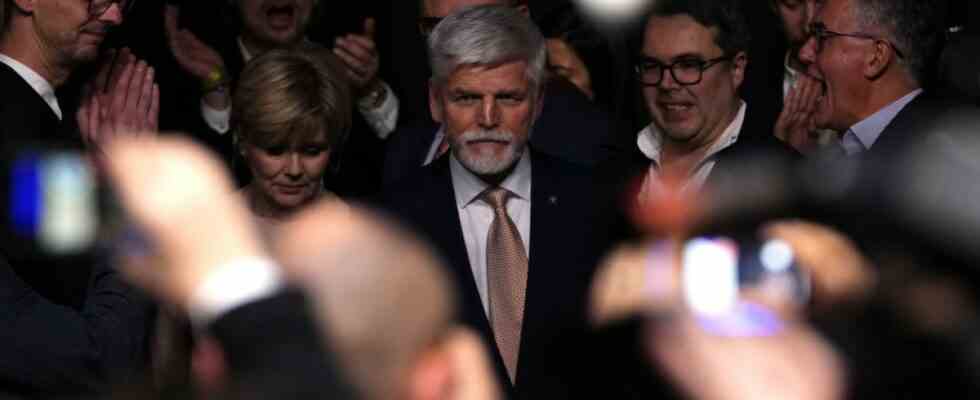Petr Pavel is not yet in office, but he is already taking on China. On Monday, the winner of the Czech presidential election had a phone call with Taiwan President Tsai Ing-wen. The conversation lasted a quarter of an hour, informed the Taiwanese Presidential Office on Twitter. Tsai Ing-wen congratulated Pavel on his election victory – he thanked her and assured her that Taiwan and the Czech Republic share the same values, namely freedom, democracy and human rights and “that we want to further strengthen our partnership”. So Pavel tweeted.
China, which sees Taiwan as part of the People’s Republic, summoned the Czech ambassador and said Pavel was untrustworthy and had betrayed his commitment to the one-China policy from the election campaign. In the Czech Republic, the social-liberal Pirate Party has been the main advocate for good relations with Taiwan. President Miloš Zeman, who is still in office, maintained close ties to China and for a long time also to Russia. He mocked security warnings from the Czech secret service BIS.
Prime Minister Petr Fiala from the conservative ODS confirmed that the Czech Republic stands by the one-China policy, but: “As a sovereign state, we decide for ourselves who we will call and who we will meet with.”
Pavel is clearly on the side of Ukraine
With the election of Petr Pavels, new, self-confident sounds from Prague will probably be heard more often. Already on Saturday after the election, Fiala had commented in clear words on the defeat of the former prime minister and now opposition leader Andrej Babiš: “We are witnessing the beginning of the end of his political era in this country.” But one should not be mistaken, it could still be “long and uncomfortable”. Zeman, who had supported Babiš, said Babiš should not be written off just yet.
The former commander-in-chief of the Czech army, Petr Pavel, clearly won the run-off election at the weekend with more than 58 percent of the votes against the populist Babiš. He conducted an election campaign without personal attacks, stands for European values and supports Ukraine against the Russian attacker. The big businessman Babiš had stirred up fears of war, looked for allies sometimes among the communists and sometimes among the right-wing extremists and, above all, criticized the government.
French President Emmanuel Macron caused anger and incomprehension in the Czech Republic when he received Andrej Babiš in Paris before the first ballot. The weekly newspaper respect sensed the Frenchman’s attempt to rally around politicians who want peace between Russia and Ukraine at any price – also to the detriment of the invaded Ukraine. Babiš had repeatedly spoken of a “peace summit” in Prague. On Saturday, Macron congratulated Pavel on the election victory.
According to Pavel’s campaign slogan, “order and calm” should now return to Prague Castle. The government expects constructive cooperation with the new president, unlike with Miloš Zeman, who disrupted and obstructed day-to-day political business. There were even constitutional complaints against Zeman because he repeatedly exceeded his authority as president.
In Slovakia there was rejoicing as if it were still about a common country
In Poland, President Andrzej Duda and Prime Minister Mateusz Morawiecki are particularly happy about Petr Pavel’s victory because Andrej Babiš said in a TV debate shortly before the election that he would not send any support to Poland in the event of an attack. In Slovakia, Pavel’s election sparked jubilation in the pro-European camp, as if it were still about a common country.
President Zuzana Čaputová traveled to Prague on Saturday and personally congratulated Pavel at his election party. Čaputová, who will have to stand for re-election in a year’s time, is also revered by many in the Czech Republic as her own president. Helpers from her 2019 campaign team had now also worked for Pavel. Like Pavel, the former civil rights activist and lawyer stands for a new beginning in politics after years of populist, extremist and, in Slovakia, also highly autocratic and corrupt politics.
“I am extremely pleased that there will be a head of state in our region and in Europe who honors democratic values and whose strength comes from peace,” said Čaputová in Prague.
At home in Bratislava, she is confronted with government chaos that has been going on for years. The minority government under Prime Minister Eduard Heger lost a vote of confidence in December and is only in office on an executive basis. This week, parliament is to agree on an early date for new elections, otherwise she will set up a government of experts, Čaputová had announced. There are fears that politicians notorious for mafia involvement will come to power again in Slovakia.

